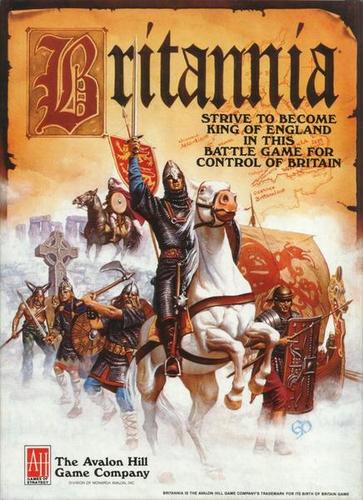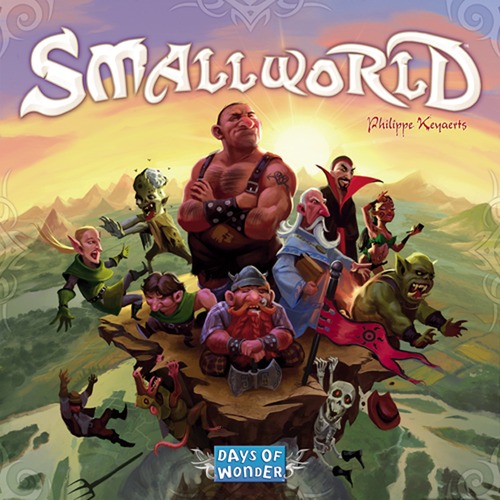When I was little, one of my favorite wargames was Lewis Pulsipher’s Britannia. In it, players play out the successive waves of invaders conquering the Isle of Great Britain, starting with the Roman conquest and concluding with the Battle of Hastings. Tribes are divvied up between four players in such a way that they will not be competing (too badly, anyway) over the same victory conditions (regions/provinces) as other tribes within that player’s color. You run through the list of tribes, growing your populace and invading by land and sea and vying for short-lived supremacy on the island.

There are a number of issues, however, that have marred my enjoyment of this classic game. The historical nature of the game makes for very unbalanced play experience. Blue(Belgae) starts the game getting creamed by Purple(Romans) but will hopefully get to make up for it at the end with the Norman invasion. Purple doesn’t get lot to do after the Romans go home, so they need to rack up most of their points on the front end. Green and Red are kind of in the middle; they hang on well early and will probably still be hanging on by the end and may have some decent “strong” factions mid-game. Of course, if Blue has some lousy rolls on the last two turns and the Normans stall out, they’ve sat around for hours eating shit-sandwiches for nothing. Totally happened to me at a con where the person signed up to run a session was a no-show but I was all “Hey, I know this game! I’ll teach people how to play!”
Despite my fond memories, I haven’t been able to bring myself to want to play Britannia since.
Enter a game called Small World. In small world, a succession of fantastical races stage series of massive invasions of a magical land, go into decline and are conquered and wiped out by subsequent invading races. Rather than historically relevant point goals such as the Welsh holding onto provinces in Wales or Roman forts burned down, races in Small World get flat points for territories held plus whatever random bonus they have when selected from the stack of available tribes – you can have mercantile Skeletons, berserker Halflings, or even burrowing Giants.

Here is the part where I like Small World over Britannia: there is a fixed number units required to conquer a territory: two to capture an empty region + 1 for each piece of cardboard in the region (enemy units, mountain tokens, fort tokens, camp tokens, etc.). The number needed to seize territory may be reduced by racial abilities. The only random element introduced during conquest comes at the end of the phasing player’s initial invasion: they get to make a final “push” where a die is rolled to see if they can allocate extra attacking factors on the last assault. While I understand that some wargamers are fans of the random element, I favor them when they can be mitigated by strategy and good decision making; there’s no such mitigation in Britannia – either you’re good at consistently rolling 5s and 6s or you’re bad at the game.
So I’d like to recommend any wargamers who enjoyed games like Britannia growing up, but have met with some of the same aggravations I mentioned above, check out Small World. In many ways, it is Britannia’s spiritual child, but the simplicity of scoring, ease of play and reduction of the random combat element makes Small World a wargame that you can bring to a table with more casual gamers and still have a great time. The relatively short playtime is also a bonus; a five player game with mixed experience players took under two hours, while a game with experienced players can easily be played in an hour to 90 minutes.
I still have a soft-spot for Britannia; it taught me a lot of history as a kid, and that’s just something that you won’t get from Small World. If anything, I’d like to see a game of Small World’s caliber and playability that is just as valuable as an educational tool as something like Britannia, but that’s no knock against the one wargame I’m able to sometimes convince folks to play with me.
-Alex
Finally one of these I have played. My Only complaint about small world is that because of how the game is setup, you can’t conquer the whole game board
-
That degree of domination is a bit beyond the scope the mythic pseudo-antiquity Small Worlds is going for and the phenomenon it is attempting to simulate. The closest real-world analog (besides Britain) would be the ancient Aegean or middle east, where you have sort of a global crossroads where tribes would migrate, settle and be invaded and displayed by other migrating groups, rinse-repeat. You don’t really come to have any extremely dominating groups until after the waves of migration end.
-
ack; displaced, not displayed…
-
Small World – what would happen if Oswald Spengler designed Risk.
I got to play it a few weeks ago. I thought it was a solid game. We were just playing head to head and I thought it might be better with more people, but still a fun game.
-
Recommended with 4 players. I’ve got an expansion for 6 that adds a necromancer who raises an army of undead out of everyone’s fallen armies, but I haven’t had a chance to play with it.
Vinci anyone? http://www.boardgamegeek.com/boardgame/60/vinci
Small World is actually almost a reskinning of the older game Vinci, which had similar mechanics, but used a map of Europe and didn’t divide the powers into race and class, each empire simply got two random titles.
Played it a bunch. Have yet to play Britannia. Honestly, SW gets a bit old for me. The scoring is simple, which is great, but the game, even with expansions, evolves into “what combos show up”. Best combo set wins, for the most part.
-
I’m sure I’d burn out on it if I could get anyone to play it with me more than once every 3 or 4 months :/
I haven’t played Britannia, but did a number of Small World games with some friends. I really enjoyed that one.
I loved the Britannia cover when I was a kid.